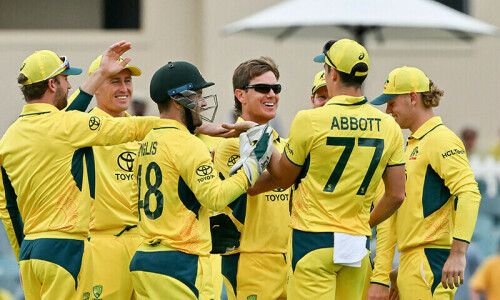Pakistan have sweet memories of the World Cup when Australia and New Zealand last co-hosted it in 1992 but their optimism will be tempered this time by their turbulent build-up to the quadrennial event.
Very few would have tipped Pakistan to win the showpiece event 23 years ago but Imran Khan's young team fought back from imminent elimination in the opening round to defeat England in the final at the Melbourne Cricket Ground.
The talented but unpredictable side are not favourites this time either and their preparations have been hamstrung by injuries to their fast bowlers and the unavailability of leading spinner Saeed Ajmal due to an illegal bowling action.
“I am happy that we are not favourites,” Pakistan coach Waqar Younis told reporters in Lahore. “To be very honest it's big pressure of being favourites.
“We were not favourites last time (in 2011) too but we played excellent cricket.
“Similarly this time, there are teams which play on those bouncy wickets like Australia and South Africa, and are probably bigger favourites than us. But we hope that with the type of resources we have we can do well.”
The former fast bowler was referring to Pakistan reaching the semi-finals in 2011 when they lost to eventual champions India.
But that time they had the advantage of playing in familiar conditions of the subcontinent, where their slow bowlers made a big impact.
Part-time off-spinner Mohammad Hafeez is also under the cloud of a suspect action and will need to get cleared before the tournament kicks off on Feb 14 and his bowling will be crucial for Pakistan in the absence of off-spinner Ajmal.
Flamboyant Shahid Afridi, who was the joint highest wicket-taker in 2011, is expected to lead Pakistan's slow bowlers with his fast leg-spinners.
Pakistan will also be without experienced fast bowler Umar Gul at the World Cup after he failed to recover sufficiently from a knee problem.
In Gul's absence, left-arm paceman Junaid Khan was expected to lead the bowling attack but the 25-year-old also suffered a hamstring injury during a conditioning camp in Lahore and was ruled out of the World Cup.
“Unfortunately injuries hit us at the wrong time and you get a setback,” Waqar added. “We had problems to our fast bowlers for few months and of course the recent episode with Junaid is a setback.”
Pakistan captain Misbah-ul-Haq himself recovered in the nick of time from a hamstring injury and the Pakistan batting will thrive on him and the experienced Younus Khan for solidity.
Misbah and Afridi have both said they will bid adieu to the 50-over format after the World Cup and Pakistan will hope they can make a lasting impression.














































